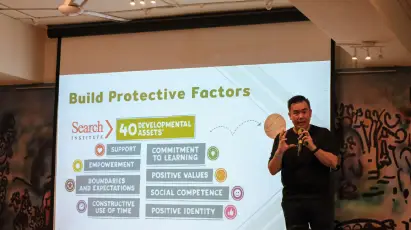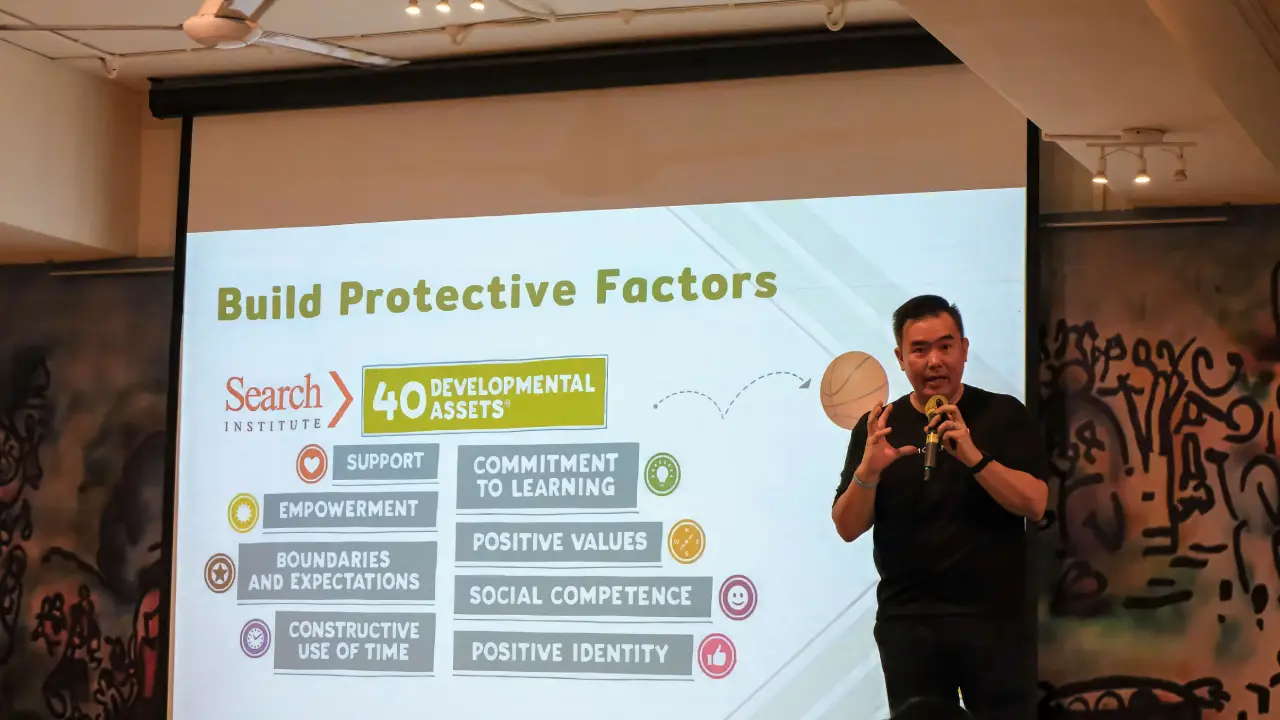In an era where children are surrounded by screens, parents today face challenges that require them to go beyond simply setting rules on screen time and device use. Recognising this challenge, Focus on the Family Singapore launched Raising Future-Ready Kids in the Digital World (RFRK), an empowering programme aimed at equipping parents and children with the tools to navigate the digital world together.
Supported by the Digital for Life (DfL) Fund, 42 workshops and talks that reached close to 1,400 participants have been conducted under this programme.
Parenting Beyond Restrictions
At the core of RFRK’s programme is rethinking what it means to be a screenwise family. Rather than solely enforcing restrictions on children, the programme emphasises the importance of two-way communication and value-based boundaries built on trust and shared responsibility between parent and child.
“A screen-smart family is not just one that enforces rules. It’s one where parents are informed, involved, and intentional about their family’s screen use,” said June Yong, Lead of Programmes at Focus on the Family Singapore.
“In such families, parents model good screen-usage while working together with their children to set online boundaries and be accountable. This happens all while prioritising their relationship and trusting each other in the process.”
This balanced approach is rooted in the belief that screens can be beneficial if families are equipped to manage their digital habits well. Through the programme, parents learn how to set healthy digital boundaries, resolve device-related conflicts, and use technology as a tool for connecting with their children.
From Talks to Practical Learning
The programme comprises two possible formats: a parenting talk and a joint parent-child workshop. Both are designed to be practical and accessible, presenting relatable stories, real-world strategies, and interactive exercises for its participants.

Mr Chong Ee Jay, a trainer at Focus on the Family Singapore, conducting an online webinar for parents.
The talks teach parents how to foster screen-wise habits at home, including:
- Establishing clear expectations around device usage
- Identifying opportunities to talk to their children about online safety and media consumption
- Practising co-using devices with their children to encourage openness
- Navigating conflicts calmly, consistently, and with empathy when they arise
During the workshops, the spotlight turns to building mutual understanding between parent and child. Children learn to share their perspective on their media use and articulate their challenges, while parents practise listening to their children and setting collaborative goals.
These sessions help break down walls and spark important conversations that often do not happen at home. “The tools and programme provide a neutral yet objective approach [to conversations around screen time] that our teens can better accept,” said one parent.
Common Worries from Parents
“Is my child addicted to their phone?”
“How do I reduce my child’s screen time while managing their unhappiness?”
“What if they need their devices for school?”
These are concerns that many participants have. Unsurprisingly, one of the most pressing concerns among participants is screen overuse and the risk of screen addiction.
These worries reflect broader trends. While children and youth in Singapore are digital natives, “there remains room for growth in digital intelligence as a society, especially in areas such as online discernment, critical thinking and emotional resilience,” said June. “Young children may lack the maturity or experience to navigate digital spaces safely in discerning whether something they encounter online is good or helpful for them.”
RFRK seeks to fill this gap by encouraging families to adopt the 3Is framework:
- Be Informed – As a parent, understand the digital landscape and educate your children about its benefits and risks.
- Be Involved – Be involved in your family’s digital use by setting boundaries together as a family and having written rules and consequences for everyone to adhere to.
- Be Intentional – Model the kind of behaviour you expect and use moments of conflict or curiosity with your child as opportunities for teaching and mutual learning.
These serve as guideposts for parenting in the digital age.
After attending the public webinar, a parent reflected: “I would like to spend more time with my younger children with devices and embark on an agreement with my older children on their device usage.”
Encouraging Open Dialogue within Families
A common challenge parents face is the belief that digital safety can only be achieved by restricting their children’s exposure to online risks or devices. Many assume that by limiting device usage, their children are automatically protected. Other parents may feel outpaced by their tech-savvy teens and believe they have little influence over their children’s digital habits.
However, as RFRK highlights, guiding children and youths on online safety can also be rooted in active engagement and open dialogue within families. It’s about teaching children how to think, not just what to do or avoid. Such dialogues can guide children and youth to spot pitfalls in real-life situations, such as how they can recognise false information or be respectful during online communication.
There are challenges, especially when children see their peers using devices freely. But through proper boundaries and consistent messaging, parents can foster an environment where digital discipline is not just enforced by them. Instead, the importance of keeping oneself safe is understood and embraced by their children, too.
Avenues of Support for Parents
Apart from talks and workshops, the programme provides online resources and even subsidised coaching and counselling support for parents. These touchpoints create an ecosystem of care that acknowledges how complex parenting in the digital age can be. As June shared, “Parents are typically concerned about whether their children or youth are currently addicted to their devices or at risk of being addicted.”
Recognising this, the programme equips parents with practical knowledge and tools to set safe boundaries and navigate tensions around screen time effectively.
Raising a Digitally Healthy Generation Together
At its core, RFRK is more than just about reducing screen time. It’s about enriching family connections, building trust between parents and their children, and giving children the tools to be responsible digital citizens and parents the confidence to guide them, even in the face of constant change in the digital landscape.
Rather than shutting the digital world out, June encourages families to approach it realistically and thoughtfully.
“When parents are informed, involved and intentional in their family’s screen use, families can adopt a realistic approach to the digital world and achieve digital wellness while remaining plugged-in.”
Empowered by the Digital for Life Fund
“The Digital for Life Fund is critical in enabling Focus on the Family Singapore’s integrated, multi-pronged approach to promoting digital literacy and wellbeing in families and children and youth,” said June.
“It has allowed the end-to-end delivery of the educational workshops and talks from curriculum development to execution to online engagement and promotion through content creation and campaigns, and the provision of subsidised coaching and counselling sessions for parents.”
Join the Digital for Life Movement and Contribute to Building a Digitally Inclusive Society
Support the Raising Future-Ready Kids in the Digital World programme by connecting with Focus on the Family Singapore.
Keen to volunteer with Focus on the Family? Join their Volunteer Open House on 20 January 2026 to learn more: https://family.org.sg/event/volunteer-open-house-jan-2026/
Or learn how you can join the Digital for Life movement by starting a project with the Digital for Life Fund.













